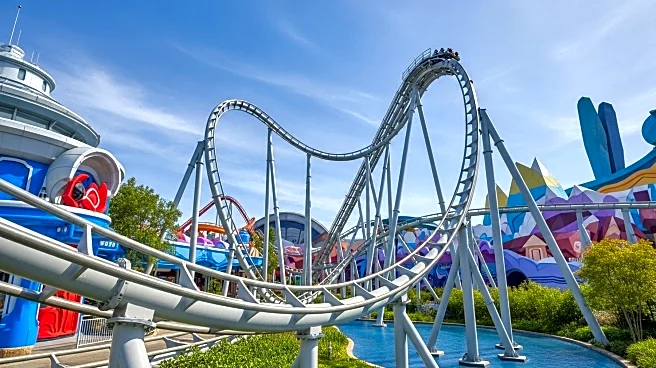What is the story about?
What's Happening?
A recent incident at Universal Orlando has reignited discussions about the regulatory framework governing Florida's theme parks. Kevin Rodriguez Zavala, a 32-year-old man, died after riding the Stardust Racers roller coaster. Despite ongoing investigations, Universal Orlando reopened the ride, a decision criticized by Zavala's family and their attorney, Ben Crump, who argue it compromises public safety. Florida's current regulatory system allows major theme parks to self-regulate, with minimal state oversight, a practice some critics say prioritizes profit over safety. Universal claims the ride was functioning correctly, supported by state officials and third-party experts. However, the family's legal team contends that the self-reporting system lacks transparency and accountability.
Why It's Important?
The incident highlights the broader issue of regulatory oversight in Florida's theme park industry, which is largely self-regulated. This system has been criticized for allowing companies to prioritize their interests over public safety. The debate is significant as it raises questions about the adequacy of current safety measures and the potential need for reform. The outcome could impact the theme park industry's operational practices and influence legislative actions regarding safety regulations. Stakeholders, including theme park operators, lawmakers, and consumer safety advocates, have vested interests in the outcome, which could lead to changes in how safety is managed and reported.
What's Next?
The ongoing investigation by the Orange County Sheriff's Office and potential legal actions by Zavala's family could prompt further scrutiny of theme park safety practices. There is also potential for legislative proposals to enhance state oversight, although past efforts have been stymied by the industry's political influence. The case may also influence public perception and consumer trust in theme park safety, potentially affecting attendance and revenue. Additionally, federal legislation, such as the National Amusement Park Ride and Safety Act, could gain traction, leading to more standardized safety regulations across the U.S.
Beyond the Headlines
The incident underscores the ethical considerations of self-regulation in industries where public safety is at stake. It raises questions about the balance between corporate interests and consumer protection. The case also highlights the role of political influence in shaping regulatory frameworks, as seen in the theme park industry's lobbying efforts. Long-term, this could lead to a reevaluation of how safety is managed in high-risk industries and the role of government oversight in ensuring public welfare.















